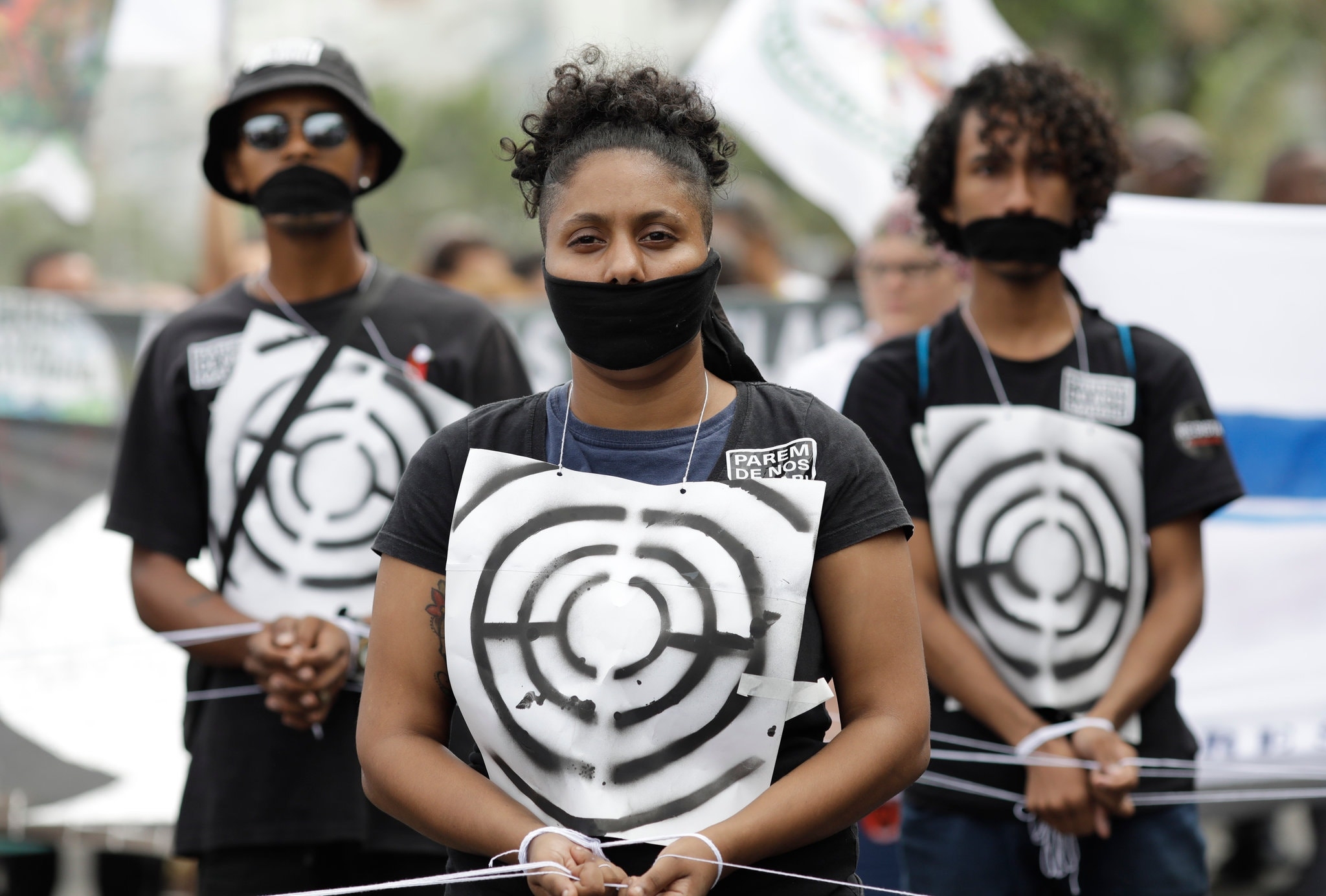
Security forces have always been unaccountable for their actions in the favelas. But under Bolsonaro, things have gotten even worse.
The New York Times
Mar. 16, 2020
by Vanessa Barbara
Contributing Opinion Op-ed Writer
SÃO PAULO, Brazil — It was around 5 a.m. on an average Tuesday. I was sitting on the sofa eating toast when I received a Facebook notification saying that a police raid had just begun. “Please don’t leave your homes,” I read. “If you are outside, take shelter!”
Classes were canceled that morning. Armored tanks rolled through the streets, shooting seemingly at random. By 8 a.m., according to reports, police officers broke into homes and tortured residents. Others headed to the roofs to set up sniper hideouts. The operation lasted all day. It was entirely typical.
Of course it didn’t happen where I live — a middle-class neighborhood in São Paulo, where such acts of state terror would be nearly inconceivable. No, the operation took place last month in Complexo da Maré, a complex of 16 favela communities in Rio de Janeiro where approximately 140,000 people live.
I recently started following the Facebook page “Maré Vive” (Maré Lives) months ago, in a vague effort to grasp what it would feel like living in a Rio favela. To keep residents safe, the page shares information and live updates on police raids in the community. Almost every morning, around 5 a.m., I receive their daily forecast. Will everything be calm in the favela today? Or are the tanks already rolling in? It’s almost like a weather forecast — if only you could trade raincoats for bulletproof vests.
And yet I can shut down the computer and forget all about it right away, if I want to. Residents can’t. In 2019, according to a report by the nonprofit group Redes da Maré, there were 39 police operations in the complex — one every 9.4 days — that lasted almost 300 hours and left 34 people dead. (None of them were white.) Twenty-four school days have been lost. (School is canceled when there’s a police raid.)
The raids are part of a disastrous policy to combat drug trafficking in Rio de Janeiro. The state’s security forces have always been violent and unaccountable for their actions in the favelas, but things have gotten even worse under the country’s far-right president, Jair Bolsonaro, and his ally, Rio de Janeiro’s governor Wilson Witzel.
Mr. Witzel has promised to “slaughter” criminals in the communities, saying that military police should “aim at their little heads.” This is at the core of his public security policy, which consists of tough-on-crime rhetoric, giving carte blanche to the police and nothing else. Last year, he claimed he should have the right to send a missile into a favela in order to “blow up these people.” He encourages incessant and deadly police invasions into poor communities in pursuit of drug gangs, failing to recognize that most of the residents are law-abiding, working citizens.
As a result, police killings in the state of Rio de Janeiro reached a 20-year high last year, with 1,810 people murdered by security forces — almost five deaths per day. (Twenty-two police officers were killed in the same period.) Police forces are now responsible for 43 percent of all the violent deaths in the state, an astonishingly high number even by Brazilian standards.
While the authorities claim that most of the victims are gang members who engaged in confrontations with the police, many cases show signs of being extrajudicial killings. Other times, victims are innocent bystanders caught in the crossfire: Six children died last year during police raids in Rio de Janeiro’s poorest communities. (Most of these murders are still unsolved.) Other victims were wrongfully targeted; if you are black and live in a favela, anything can be mistaken for a gun. People have been killed for carrying an umbrella, an hydraulic jack, a cellphone, a backpack. Four years ago, a 16-year-old boy was killed when his bag of popcorn was mistaken for drugs.
In the poorest neighborhoods, random episodes of violence, torture, humiliation and verbal aggression by the police are so common that we have a word in Portuguese for them: “esculacho.” The slang refers to the degrading treatment of black poor citizens by police officers. Kicking down a door and waking up everyone inside the house, putting rifles to their heads and accusing them of using drugs? Pretty typical esculacho. “Our society has constructed the idea that the favela is inferior, that the people who live there are worth less,” the journalist and activist Raull Santiago said in an interview with The Guardian. He is the co-founder of “Papo Reto” (Straight Talk), a group similar to “Maré Vive,” which monitors police abuses in the Complexo do Alemão favela, also in north Rio de Janeiro.
Last year, Mr. Santiago recorded and broadcast several scenes of the police in armored helicopters opening fire at his neighborhood from above. Firing from helicopters has intensified in the last couple of years — so much so that a school in Complexo da Maré installed a big yellow sign on the rooftop that read, in capital letters: “SCHOOL, DON’T SHOOT.”
At least two people died and two were wounded in the “typical” raid in Complexo da Maré I mentioned earlier, which took place on Feb. 18. The authorities found one rifle and two radio transmitters.
It’s obvious that these random, brutal police raids are not effective at combating organized crime or drug trafficking. They do certainly serve to undermine any trust that residents may have in the police, which should be protecting them, and in the government, which should at least acknowledge them as citizens.
I don’t know what it would take for the authorities to understand that people who live in favelas are just as deserving as anyone else when it comes to eating their toast in peace and, well, staying alive. But I have a suggestion. Let’s install a sign on every rooftop and every street: “HUMAN BEINGS, DON’T SHOOT.”
Vanessa Barbara is the editor of the literary website A Hortaliça, the author of two novels and two nonfiction books in Portuguese, and a contributing opinion writer.
A version of this article appears in print on March 22, 2020, Section SR, Page 3 of the New York edition with the headline: Brazilian Police Are on a Rampage.

